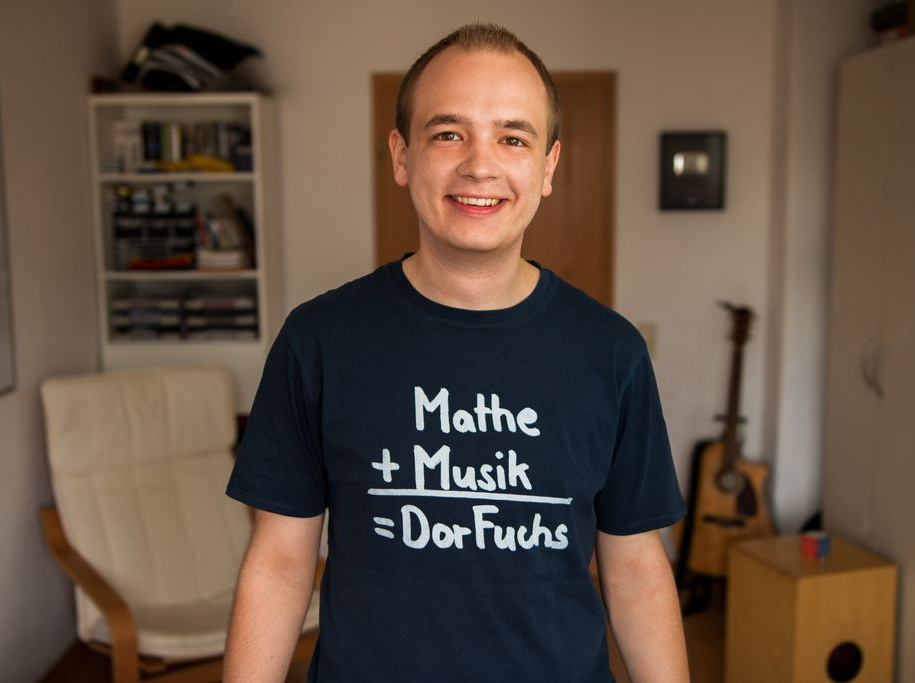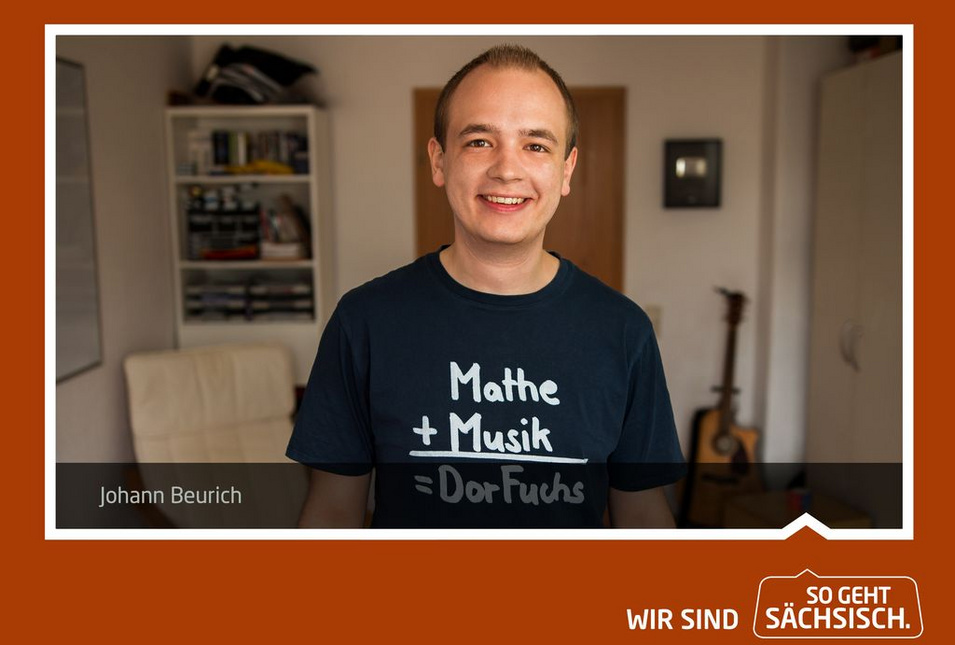“Mathematics alone is enough for a whole lifetime”
Johann Beurich – aka “DorFuchs” which is Saxon German for “the fox” – is rocking German classrooms with his maths songs. Schoolchildren, teachers, students, and tutors love his entertaining lessons wrapped up in music. Binomial formulas, mental arithmetic, fractions – there are hardly any mathematical problems the likeable YouTuber from Dresden doesn’t have a musical answer for. His songs and teaching videos have been viewed millions of times. How it all began, what drives him, and why sometimes you only need a little mnemonic to solve the most complex of tasks – we talked to Johann Beurich to find the answers.
Johann, you studied Mathematics, are working on a doctorate at the TU Dresden, got married recently – all relatively unspectacular at first glance. But not many people know that you have a second life as a popular YouTube star. How did you get the idea of composing maths songs and uploading them on YouTube?
I tried all sorts of things out when I was at school: playing football, programming, making music, creating videos and publishing them to YouTube and so on. When I wanted to write my own song, I took a topic I had already thought about a lot and liked talking about. That was the derivation of the pq formula. (Note: The pq formula is a formula for the solution of quadratic equations in normal form.)
In classrooms in Saxony and on computers at home, you’re a popular guest or tutor. Is this educational aspiration important to you or is entertainment more your focus?
To be honest, at the beginning I didn’t expect that the songs would be taken seriously at all. It was important to me that everything was accurate mathematically and well-prepared didactically. But success really only came with the entertainment value.
What’s the secret of the success of your songs and learning videos?
I try to present the things I worked out with lots of mental effort of my own effortlessly, like an act in a circus performance. Lots of things aren’t easy to understand, but are easy to explain. And with the songs, earworms help to remember the formulas so they stay in your head for a long time.
Do you sometimes get negative feedback from your followers, like complaints along the lines of “I watched your video and still got a bad grade in Maths!”?
Sure, there’s always that kind of comment. But always with tongue in cheek. In general, though, I get overwhelmingly positive feedback.
Will YouTubers like you eventually put teachers out of a job?
No. I might be able to provide a good explanation, but for a pupil or a whole class to really make progress, you need to discuss comprehension problems. A video can only partially help with that. But it can inspire students, make them curious about maths, that’s for sure.
You’re soon going to be travelling through the state and “calculating” Saxony for “Simply Saxony”. What does home mean to you?
A great deal! Saxony is my home, my family lives here, and the dialect is just amusing. That’s why my stage name is “DorFuchs”, too.
How do you think Saxony is viewed by the rest of the world?
With the Saxon dialect, unfortunately I think we’re still seen as rather below-average with regards to intelligence. All just stereotypes! But then I enjoy it all the more to let my Saxon side out, especially as a graduate of mathematics and a PhD student.
What cliches about Saxons annoy you the most?
I read an ironic tweet recently with the background that some people are calling for Ukraine to just surrender part of their country to Russia, where they were asking which state the Germans would be prepared to give up. And some people said Saxony, probably because they have the image of a state full of Nazis. I found that really sad.
What are your favourite places in Saxony?
Radebeul. To be more precise, a little football pitch at the Sachsenplatz, where I spent a lot of my childhood kicking a ball around.
Is there a passion project you would like to work on in the future?
My YouTube channel is the biggest project in my life so far; I’d like to keep developing it. Especially when another big personal project is finished, hopefully in the next few years: my doctoral thesis.
Just out of interest: in one of your recent videos, you talked about a mathematical problem you couldn’t solve. What was it?
The question of what number should be where the question mark is here:
20 ➞ 4 ➞ 16 ➞ 37 ➞ 58 ➞ 89 ➞ 145 ➞ ? ➞ 20 ➞ 4 ➞ … I couldn’t find the pattern behind it for the life of me.
And a final question: When you’ve exhausted all of Maths, which subject is next on your list?
Mathematics is enough for a whole lifetime. But of course, at some point you’ve used up all the interesting topics. But as long as I’m still working at the university as a mathematician, I’ll use the time to keep playing around with mathematics. Afterwards I could imagine doing all sorts of things, the main thing is to keep making videos and songs.

DorFuchs on Youtube
Johann Beurich – aka “DorFuchs” which is Saxon German for “the fox” – is rocking German classrooms with his maths songs.
DorFuchs on Youtube